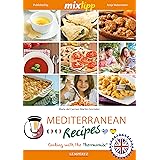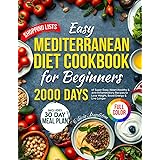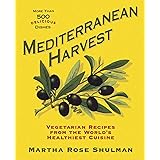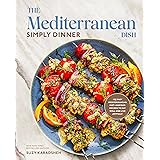In a world often saturated with restrictive eating plans and calorie-counting regimens, the quest for a genuinely sustainable and beneficial dietary approach can feel overwhelming. Many individuals become disheartened by temporary solutions that fail to address long-term health and well-being. It is within this landscape of nutritional confusion that a time-honored tradition consistently stands out. The information presented in the accompanying video provides an excellent introduction to an eating pattern celebrated for its profound health benefits and delicious simplicity.
For centuries, populations residing in countries bordering the Mediterranean Sea have been observed living remarkably healthy and vibrant lives. Their traditional way of eating, often referred to as the Mediterranean diet, represents much more than a mere food plan. It embodies a comprehensive lifestyle that prioritizes fresh, whole ingredients, communal dining, and regular physical activity. This approach is increasingly recognized not only for preventing chronic diseases but also for promoting a joyful relationship with food and fostering a sense of community around the table. Exploring this dietary philosophy can unlock secrets to enhanced vitality and longevity.
Unpacking the Mediterranean Diet: More Than Just Food
The term “diet” frequently conjures images of temporary deprivation and strict adherence to a rigid set of rules. However, the Mediterranean diet diverges significantly from this conventional understanding. Instead, it is best described as a comprehensive lifestyle, deeply ingrained in the cultural heritage of countries like Greece, Italy, and Spain. This eating pattern has evolved over generations, reflecting an intimate connection to the land and its bounty. A blueprint for healthy living is provided, built upon readily available and naturally wholesome foods.
The core principles of this approach are deceptively simple yet profoundly impactful. An emphasis is placed on consuming what grows from the ground, enriching dishes with aromatic herbs and spices, and enjoying meals in the company of loved ones. This holistic perspective acknowledges the powerful interdependence of food, social interaction, and overall well-being. It encourages mindful eating, where each bite is savored, and regular physical activity is naturally integrated into daily routines. This is not merely a modern health trend; its incredible efficacy was first brought to global attention during the famous Seven Countries Study in the mid-20th century. Researchers at that time noted the extraordinarily low rates of heart disease prevalent among Mediterranean populations, consistently pointing back to their distinctive way of life.
Scientific Backing: Why the Mediterranean Lifestyle is Praised
The enduring popularity of the Mediterranean diet is not simply attributable to its cultural appeal or delicious flavors; it is overwhelmingly supported by robust scientific evidence. For many decades, researchers worldwide have meticulously studied this eating pattern, with consistently positive and often remarkable findings. The benefits observed extend across numerous physiological systems, making it one of the most thoroughly validated dietary interventions available. Its profound impact on long-term health is a key reason for its recommendation by health professionals globally.
Exceptional Benefits for Heart Health
Among its many accolades, the Mediterranean diet truly shines in its ability to promote superior heart health. A landmark investigation, known as the PREDIMED Trial, was meticulously conducted in Spain, involving thousands of participants. This pivotal study demonstrated that adherence to a Mediterranean diet, particularly when generously supplemented with extra virgin olive oil or nuts, could reduce the risk of major cardiovascular events like heart attacks and strokes by approximately 30%. This significant reduction is attributed to several underlying mechanisms, including the diet’s capacity to lower detrimental LDL cholesterol levels, mitigate systemic inflammation, and notably enhance the functional integrity of blood vessels. Such evidence underscores its critical role in cardiovascular protection.
Boosting Brain Power and Cognitive Function
Beyond its cardiovascular benefits, the Mediterranean diet is also highly regarded for its positive influence on brain health and cognitive function, particularly as individuals age. The abundance of healthy monounsaturated fats, potent antioxidants, and essential vitamins found in staple foods like olive oil, nuts, and leafy green vegetables has been consistently linked to improved cognitive performance. Furthermore, a reduced risk of developing neurodegenerative conditions such as Alzheimer’s disease has been observed among those who follow this eating pattern. Some studies even suggest that the diet possesses the capacity to slow down the natural process of brain aging, contributing to sustained mental sharpness throughout life.
Broader Health Benefits and Longevity
The advantages of the Mediterranean eating pattern extend far beyond heart and brain health, encompassing a wide spectrum of systemic benefits. Research has firmly established connections between this lifestyle and a reduced incidence of type 2 diabetes, a lower risk for certain types of cancer, and demonstrably improved gut health. The promotion of a diverse and beneficial gut microbiome is believed to contribute significantly to overall wellness. Moreover, a recent 2025 study highlighted an intriguing link between the Mediterranean diet and enhanced oral health, likely due to its powerful anti-inflammatory properties that impact gum disease and other oral conditions. These benefits are not the result of magic but rather the synergistic effect of nutrient-dense, anti-inflammatory foods meticulously working together to maintain optimal bodily function and promote longevity.
Visualizing Your Plate: Key Components of the Mediterranean Diet
To fully embrace the Mediterranean diet, it is helpful to conceptualize its fundamental components, often illustrated through a traditional food pyramid. This visual aid effectively categorizes foods based on the frequency and quantity with which they should be consumed. The structure emphasizes a plant-forward approach, with core elements forming the base and foods to be eaten sparingly located at the apex. Understanding this hierarchy allows for intuitive meal planning and sustainable dietary adjustments, making the transition to this eating pattern much more manageable and enjoyable.
The Foundation: Abundant Fruits and Vegetables
At the very base of the Mediterranean food pyramid are fruits and vegetables, forming the indispensable foundation of this eating pattern. A wide and colorful variety of these nutrient powerhouses is encouraged for daily consumption. Imagine vibrant salads brimming with crisp greens, juicy tomatoes, and bell peppers, or tender roasted vegetables seasoned with herbs as a substantial side dish. In regions like Greece, for example, it has been observed that individuals consume an impressive average of nine servings of antioxidant-rich fruits and vegetables daily. This consistent intake provides essential vitamins, minerals, and fiber, contributing significantly to overall health and disease prevention.
Whole Grains, Legumes, and Nuts for Sustained Energy
Moving up from the base, the next tier emphasizes whole grains, legumes, and nuts, which are crucial for providing sustained energy and satiety. Foods such as whole-wheat bread, brown rice, quinoa, and oats are preferred over their refined counterparts. Legumes, including lentils, chickpeas, and beans, offer excellent sources of plant-based protein and dietary fiber. Nuts, like almonds and walnuts, are packed with healthy fats, fiber, and various micronutrients. These components work together to promote digestive health, stabilize blood sugar levels, and keep hunger at bay between meals.
The Liquid Gold: Extra Virgin Olive Oil
The primary source of fat in the Mediterranean diet is undeniably extra virgin olive oil (EVOO), affectionately termed “liquid gold.” This fundamental ingredient is utilized for virtually every culinary purpose, from sautéing and roasting to generously dressing salads and dipping bread. EVOO is celebrated for its high content of monounsaturated fats, particularly oleic acid, which is known to be beneficial for heart health. Furthermore, it is rich in antioxidants and anti-inflammatory compounds, contributing significantly to the diet’s protective qualities. Its pervasive use is a defining characteristic of Mediterranean cuisine, imparting both flavor and health benefits.
Lean Proteins: Fish, Poultry, Eggs, and Dairy
Ascending further up the pyramid, fish and seafood are recommended to be consumed at least twice a week. Fatty fish species like salmon, sardines, and mackerel are especially valued for their rich content of omega-3 fatty acids, which are crucial for brain function, heart health, and reducing inflammation. Moderate portions of poultry and eggs are also included, providing essential protein. Dairy products, particularly fermented varieties such as yogurt and traditional cheeses like feta, are enjoyed in moderation. These dairy options offer beneficial probiotics and calcium without being consumed in excessive quantities.
Reserved for Special Occasions: Red Meat and Sweets
At the very tip-top of the Mediterranean food pyramid are foods that are consumed least often: red meat and sweets. These items are reserved for special occasions rather than being part of the everyday diet. A general guideline suggests consuming small portions of red meat only once a week or a couple of times a month. Similarly, sugary desserts are enjoyed sparingly, with fresh fruit often serving as the primary sweet treat. This emphasis on moderation helps to reduce the intake of saturated fats and added sugars, aligning with the diet’s overall health-promoting goals. Adequate hydration with plenty of water is also paramount, and red wine may be enjoyed in moderation with meals if one already consumes alcohol, but there is no expectation or need to start if abstinence is preferred.
Embarking on Your Mediterranean Journey: Practical Steps for Beginners
The prospect of changing long-standing eating habits can often feel daunting, but the beauty of the Mediterranean diet lies in its inherent flexibility and the ability to ease into it gradually. It is not about an overnight overhaul but rather a process of making simple, sustainable swaps that accumulate over time. Incorporating these changes into daily life can transform eating habits without feeling overly restrictive or complicated. The journey towards a Mediterranean lifestyle is one of discovery and enjoyment, not deprivation.
Tip One: Swap Your Fats with Extra Virgin Olive Oil
One of the most impactful and straightforward changes that can be implemented is a mindful swap of cooking fats. Traditional butter and highly processed vegetable oils should be gradually replaced by extra virgin olive oil as the primary fat for cooking, baking, and dressing salads. Imagine the enhanced flavor profiles in your dishes, alongside the infusion of healthy monounsaturated fats and powerful antioxidants. This simple substitution immediately aligns daily culinary practices with a core principle of the Mediterranean diet, significantly boosting the nutritional quality of meals. It is a foundational step that yields considerable health dividends.
Tip Two: Make Vegetables the Star of Your Plate
Instead of relegating vegetables to a small side dish, the Mediterranean approach encourages making them the undisputed star of every meal. A conscious effort can be made to ensure that at least half of the plate is filled with a vibrant assortment of vegetables. This often means rethinking meal composition; for instance, dinner might begin with a large, colorful salad generously dressed with olive oil, followed by smaller portions of protein and whole grains. Imagine your plate overflowing with diverse colors and textures from various roasted, steamed, or fresh vegetables. This adjustment naturally increases fiber intake, enhances nutrient density, and supports healthy weight management.
Tip Three: Embrace Meatless Mondays
Dedicate one day a week to plant-based meals by embracing “Meatless Mondays” or a similar initiative. This is a superb opportunity to experiment with the incredible versatility and flavors offered by beans, lentils, chickpeas, and other whole grains. Imagine the culinary possibilities: a hearty lentil stew, a robust chickpea curry, or a vibrant quinoa salad. Not only does this practice introduce exciting new recipes and ingredients into your repertoire, but it also reduces overall meat consumption, which is a key tenet of the Mediterranean diet. It is an approachable way to integrate more plant-based protein sources into your weekly meal plan, benefiting both your health and the environment.
Tip Four: Snack Smarter with Whole Foods
Mindful snacking plays a crucial role in maintaining energy levels and preventing overeating. Instead of reaching for highly processed chips, cookies, or sugary granola bars, opt for Mediterranean-friendly alternatives. A small handful of unsalted nuts, such as almonds or walnuts, provides healthy fats and protein. Fresh fruit offers natural sweetness and fiber. Olives, rich in healthy fats, make another excellent choice. Imagine a vibrant spread of hummus with crisp vegetable sticks like carrots, cucumbers, or bell peppers. These smarter snack choices help to keep blood sugar stable and provide sustained energy throughout the day, avoiding the typical energy crashes associated with processed snacks.
Tip Five: Prioritize Whole Grains
A significant shift toward whole grains is another impactful step in adopting the Mediterranean diet. Replace refined white bread, pasta, and rice with their whole-grain counterparts. This includes options such as whole-wheat bread, brown rice, quinoa, and whole-wheat pasta. The fiber content in whole grains is substantially higher, which contributes to increased satiety, improved digestive health, and more stable blood sugar levels. Imagine enjoying the richer textures and deeper flavors of whole-grain products, knowing they are also providing superior nutritional benefits. Making these switches consistently contributes to the long-term health advantages associated with this eating pattern.
Navigating Common Pitfalls on the Mediterranean Path
While the Mediterranean diet is celebrated for its flexibility and ease of adoption, certain common missteps can inadvertently dilute its intended health benefits. Awareness of these potential pitfalls is crucial for successfully integrating this lifestyle into daily routines. Avoiding these traps ensures that the authenticity and efficacy of the Mediterranean approach are maintained. A clear understanding of what to watch out for helps in making truly health-supportive choices.
Beware of Processed “Mediterranean-Style” Foods
A common mistake encountered by beginners is falling prey to highly processed foods marketed as “Mediterranean-style.” Just because a package proclaims “Mediterranean” on its label, or contains ingredients like olive oil, does not automatically equate to it being genuinely healthy or aligned with the diet’s principles. Items such as pita chips, certain crackers, or pre-made sauces might seem convenient but often contain excessive amounts of added sugars, unhealthy fats, and artificial ingredients. Focus should always be directed towards whole, unprocessed ingredients, mirroring the simplicity and natural goodness of traditional Mediterranean cuisine. True adherence prioritizes fresh produce and minimally altered foods over convenient, but often misleading, packaged alternatives.
Mind Your Portion Sizes, Even for Healthy Foods
Even though the Mediterranean diet emphasizes healthy foods, it is important to remember that all foods contain calories, and mindful portion control remains relevant. Extra virgin olive oil, while incredibly beneficial, is calorie-dense; liberally drenching food in it can lead to unintentional calorie surpluses. Similarly, nuts are a fantastic source of healthy fats and nutrients, but a small handful constitutes a serving, not an entire bag. Imagine savoring a moderate amount of these rich foods, allowing their flavors and nutritional benefits to be appreciated without overconsumption. Understanding appropriate serving sizes helps ensure that even the healthiest ingredients contribute positively to overall caloric balance and weight management, without negating other beneficial aspects of the diet.
Do Not Neglect the Lifestyle Aspect
Perhaps the most overlooked, yet critically important, aspect of the Mediterranean diet is its inherent lifestyle component, which extends far beyond mere food choices. This eating pattern is deeply intertwined with how one eats, not just what one eats. It encourages slowing down during meals, being present, and stepping away from distractions like phones or screens. Sharing meals with friends and family fosters social connection and enhances the overall dining experience, recognizing the powerful communal aspect of food. Furthermore, engaging in regular physical activity, even a simple walk after dinner, is an integral part of this holistic approach. These habits are as fundamental to long-term health and well-being as the nutrient-dense foods themselves, providing a comprehensive framework for a vibrant life.
Navigating Your Mediterranean Diet Journey: Questions Answered
What is the Mediterranean Diet?
The Mediterranean Diet is a traditional eating pattern and lifestyle from countries bordering the Mediterranean Sea. It emphasizes fresh, whole ingredients, communal dining, and regular physical activity, rather than being a strict diet.
What are the main health benefits of the Mediterranean Diet?
This diet is widely praised for promoting excellent heart health, boosting brain power and cognitive function, and contributing to overall longevity. It can help reduce the risk of chronic diseases like heart attacks, strokes, and type 2 diabetes.
What kinds of foods are core to the Mediterranean Diet?
The diet focuses heavily on fruits, vegetables, whole grains, legumes, and nuts, with extra virgin olive oil as the primary fat. Fish and seafood are eaten often, while red meat and sweets are reserved for special occasions.
How can I start following the Mediterranean Diet as a beginner?
You can begin by swapping cooking fats for extra virgin olive oil and making vegetables the main part of your meals. Also, try dedicating one day a week to plant-based meals and choosing whole grains over refined ones.











